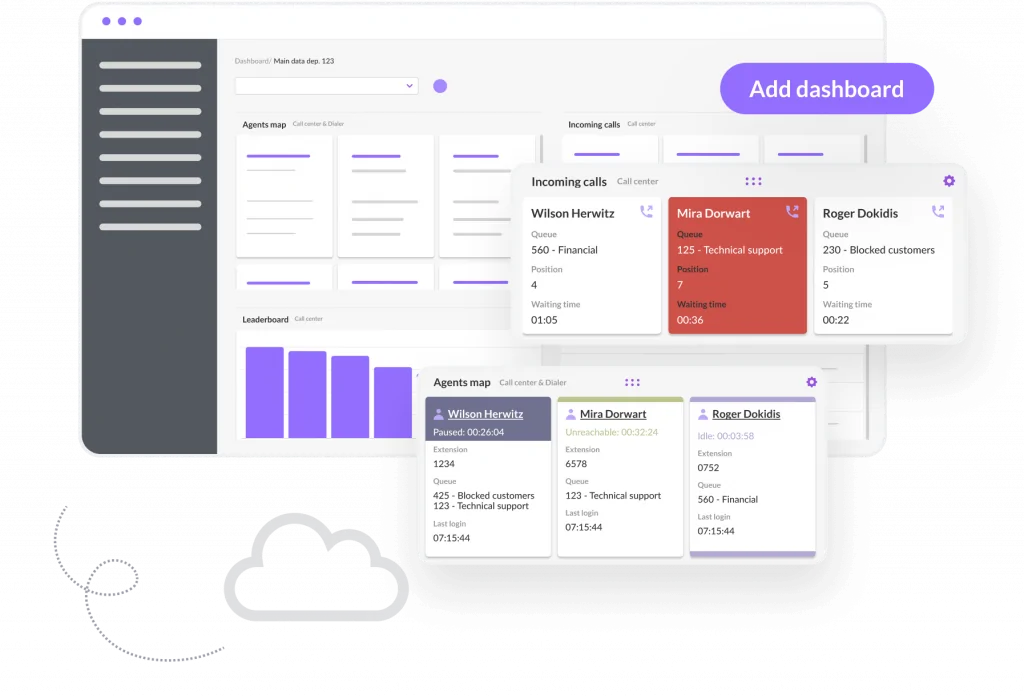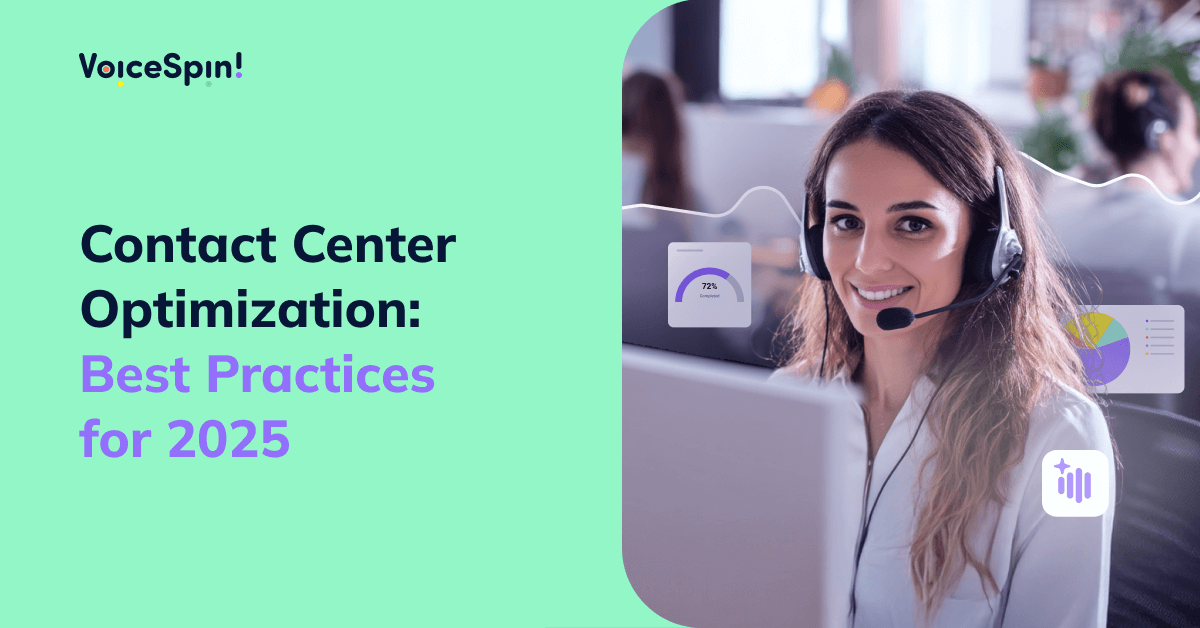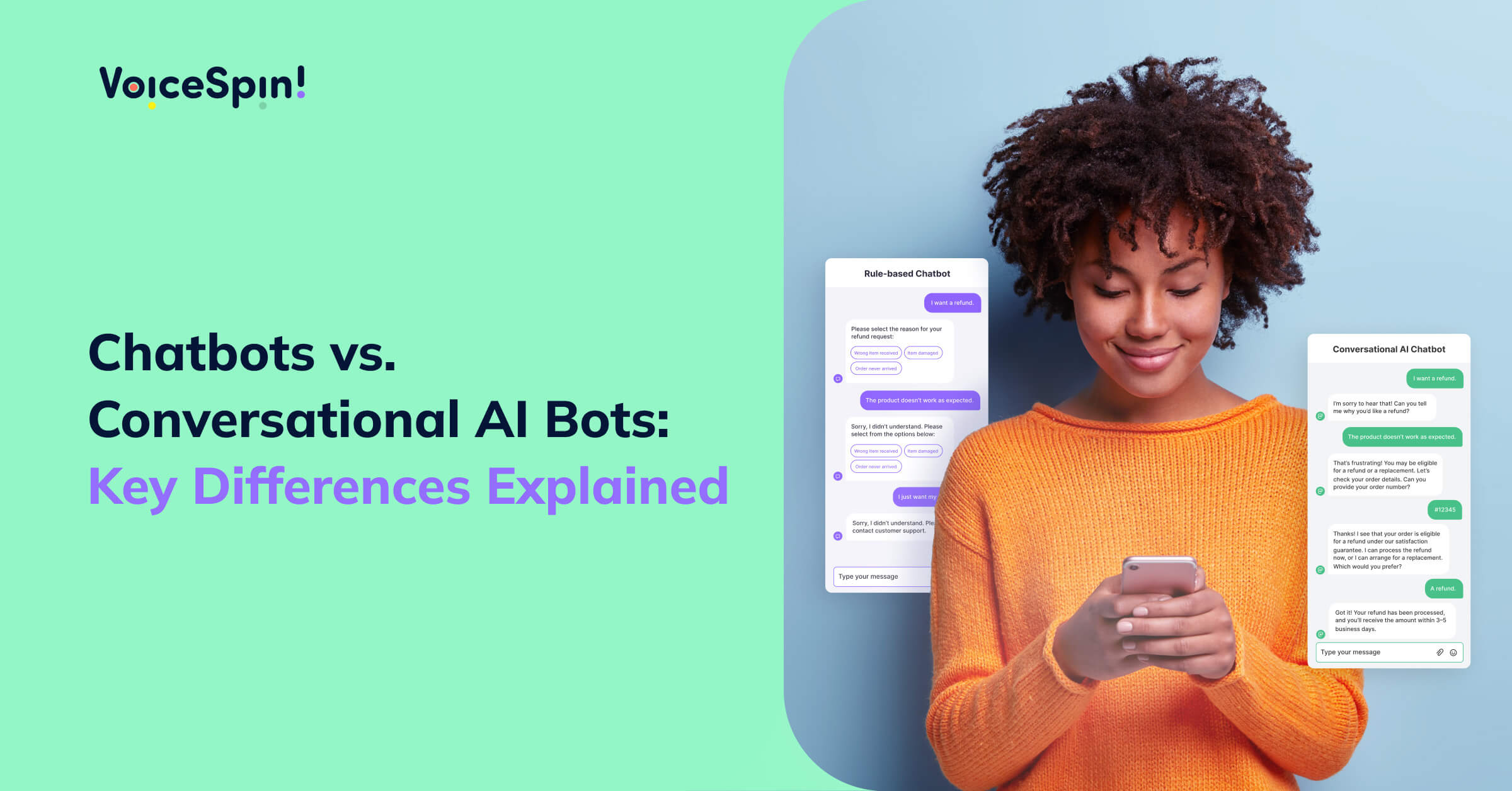Despite the undeniable importance of using top-notch call center software technology, the overall efficiency of your call center largely depends on how well-trained, skilled, and experienced your call center agents are. That makes efficient, ongoing call center training a critical piece of the puzzle you simply can’t afford to ignore as a manager.
Comprehensive and well-thought-out call center training programs help agents build the knowledge, skills, and confidence they need to deliver outstanding customer experiences on customer service calls or close more deals on sales calls. That’s why call center training has always been one of the key pillars of running a successful call center. In this blog, we’ve covered everything you need to know to craft a highly efficient call center training program for your team to ensure you set your reps up for success from the get-go.
What is Call Center Training?
Call center training is basically the process of educating your call center representatives on the critical knowledge and skills (both hard skills and soft skills) they need to do their jobs efficiently, whether it’s serving customers and handling customer requests or selling your products and services through outbound calling.
From using your virtual call center software in the most efficient way to learning best practices on how to solve complex customer issues or mastering the art of handling sales objections – your call center agent training should include everything that can help your reps do their day-to-day tasks more effectively, driving customer satisfaction and your business growth. And while many think of training as a one-time event, the key is to ensure that it’s an ongoing process that extends far beyond the onboarding phase.
The Importance of Effective Call Center Training

Improved agent efficiency
Regular call center agent training helps agents sharpen both soft and hard skills, fill knowledge gaps, gain industry-specific knowledge, and be up-to-date with the latest industry trends. That can help them resolve customer issues faster and more efficiently, avoid mistakes (such as providing incorrect information to prospects or customers), and improve their overall productivity.
Better engagement and retention
Everyone working in the call center industry is well aware of the high turnover rates among call center employees. While there are numerous reasons for that, lack of proper training and professional development in the workplace is definitely one of the top demotivating factors that impacts employee retention and leads to high turnover in call centers. By providing your reps with ongoing training and offering them professional development opportunities, you can better retain your team members and improve engagement and motivation.
Increased customer service quality
Obviously, well-trained and well-skilled agents can better serve your customers, solve complex issues faster, and are able to deliver outstanding service experience by demonstrating excellent call-handling skills and empathy. Ultimately, that results in improved First Call Resolution (FCR) rates, shorter Average Handle Times (AHA), and improved Customer Satisfaction Scores (CSAT). And considering that according to a Salesforce study, 88% of consumers claim the experience a company provides is just as important as its products and services – you shouldn’t undervalue the importance of properly training your customer-facing reps.
Better sales conversions

For outbound call centers, training is essential, too. Firstly, your sales reps need to have in-depth product knowledge and understand the fundamentals of the industry your business operates in. Secondly, they need to be trained to handle common sales objections and navigate sales conversations with confidence while also demonstrating persuasive speaking skills. With proper onboarding and training, your sales agents will be able to hit their sales targets faster, driving more revenue for your business.
Call Center Training Tips and Best Practices for Managers

Start with proper onboarding from day one
Call center agent training should start with proper onboarding if you want to make sure your new hires are off to a great start and get up to speed as quickly as they can. On top of that (and it’s been actually proven by numerous studies), efficient onboarding has a direct correlation with employee retention. In fact, according to research by the Brandon Hall Group for Glassdoor, organizations with a strong onboarding process improve new hire retention by 82% and productivity by over 70%.
Another study conducted by BambooHR revealed that when employees feel they had an effective onboarding experience, they are 18 times more likely to feel committed to the organization they are working for. Call center software features like call recording and call whispering are excellent tools managers can use to speed up and enhance the onboarding process for newly hired agents (we’ll explore them in more detail below).
Cover must-have training topics
As part of your call center training, a comprehensive agent onboarding program should cover the following must-have topics:
- Product/ service knowledge: Your customers want to interact with knowledgeable representatives who can resolve their issues during a single interaction. A Salesforce study found that 83% of consumers expect to solve complex issues by speaking to one person. With in-depth, expert product knowledge, your reps will be able to resolve customer issues quickly and efficiently, ensuring high FCR rates and customer satisfaction. That is why training your new hires to be product experts is the foundation for efficient call handling.
- Software systems and tools: To handle inbound and outbound customer interactions effectively, your call center reps must be 100 percent confident in using your call center software and other software solutions. From how to use hold and call transfer functions to how to leverage AI tools and set up outbound calling campaigns, make sure your agents are able to get the most out of your call center system and use it in the most efficient way.
- Call center policies and compliance: Every organization has internal policies (like SLA and return policies) and standard operating procedures (SOPs) that agents must follow. Most importantly, every industry may have specific compliance requirements and security policies – and violating them leads to legal penalties, financial loss, and reputational damage. That’s why compliance training should be your top priority. Agents must be well-versed in relevant laws and regulations and know how to handle sensitive customer information to prevent compliance issues from happening in the first place.
- Call center etiquette and soft skills training: To ensure high levels of customer satisfaction, agents should know call center etiquette best practices. That includes how to properly greet callers, how to verify understanding of a customer’s problem, how to put a caller on hold, how to transfer or escalate a call, how to say ‘No’, how to apologize, how to handle complaints, how to deal with frustrated customers, and how to wrap up the call. In addition to that, you should also train your reps on the most critical soft skills, such as active listening, communication skills, empathy, problem-solving, and others.
- Handling outbound sales calls: Dealing with objections might be the biggest challenge for agents handling outbound sales calls. That’s why if you are running an outbound call center, training your sales reps on how to handle sales objections should be the most important part of your call center training program. Failing to respond to ‘It’s too expensive’, ‘We already work with [Competitor]’, and other common objections effectively is one of the major reasons for lost sales opportunities.
- Best practices for different support channels: More call centers are gradually evolving into omnichannel contact centers, and omnichannel contact center software solutions are getting increasingly adopted by businesses in various industries. If you’ve already embraced an omnichannel approach and support your customers across different communication channels (like live chat, social media, or instant messaging apps), make sure to train your reps on how to best support customers and handle interactions on each specific channel.
Leverage call center technology to enhance your training
Let’s now overview some specific call center software features and tools that call center managers can use to enhance their agent training process.
- Call recording: Call recordings can help you streamline the onboarding process for new hires by demonstrating examples of the ‘right way’ and the ‘wrong way’ to respond to customers during interactions. Learning from real-life examples of how to handle angry customers, what to say if you can’t provide an immediate resolution to the customer’s issue, or how to handle every other possible scenario will give your newly hired reps a better understanding of how they should (or should not) respond to customers in similar situations.
- Real-time call monitoring: Besides reviewing recorded calls, managers can take advantage of the real-time call monitoring feature and listen in on active calls as they are happening. Being able to hear first-hand how agents interact with customers or prospects and how they deal with complaints or handle complicated issues gives you a wealth of insights and allows you to easily spot inefficiencies and improvement opportunities so you can adjust your training accordingly and provide targeted coaching to lower-performing reps.
- Live call whispering: Live call whispering is an excellent call monitoring feature that can help you accelerate and improve the onboarding process. It allows you to join in on active calls and secretly provide on-the-fly guidance to struggling agents without the prospect or customer on the other end hearing anything or even being aware of your presence. This way, you can support your newly hired reps and boost their confidence while helping them get up to speed faster and more effectively.
- Call center reporting: With call center reporting features of call center software solutions, you can easily track a variety of call center metrics and KPIs, monitor agent performance, and evaluate the efficiency of your call center operations. Based on the metrics and agent performance KPIs, you can instantly see what’s working well and what isn’t and where your team members require additional training.
- Call transcription: Call transcription converts phone calls into written text in real time by using ASR (Automatic Speech Recognition) technology. Reviewing call transcriptions enables call center managers and supervisors to assess agent performance without having to listen to call recordings and saving them time and effort. And again, that allows you to easily spot agent knowledge gaps and additional training opportunities.
- Speech analytics: In addition to transcribing customer calls in real time, advanced speech analytics software solutions allow you to do much more. E.g., with VoiceSpin’s AI Speech Analyzer, you can track customer sentiment through sentiment analysis capabilities and see how your customers or prospects feel about interactions with your reps. And what’s more, you can generate AI call summaries based on your specific requirements and identify agent training opportunities without having to listen to an entire call recording or read a full transcript.
Build a comprehensive internal knowledge base for self-training
Even though it takes time and effort to build a comprehensive internal knowledge base for your call center agents, it will surely pay off in the long run. That can include in-depth details of your products or services, how-to guides, training videos, infographics, and other self-training materials and resources that can help your team members build knowledge on their own and become better informed about your company, your products and services, policies and procedures, and best practices.

What’s particularly great about having an easily searchable and accessible internal knowledge base is that your agents can use it to double-check things and find answers to the questions they don’t know right when they are on calls without having to ask a supervisor or other team members. It can also help you reduce AHT and call transfers and increase FCR rates.
Use shadowing as part of new hire training
Although considered resource-heavy, shadowing, or peer learning, is one of the most efficient call center training methods primarily used for onboarding new reps. Shadowing is basically when a newly hired agent is paired with a more experienced rep to watch them handle customer calls and gain first-hand experience. The agent being ‘shadowed’ is usually a top performer. New hires simply observe your seasoned reps answer calls, resolve issues, and handle complaints, learning how to do it in practice rather than in theory.
By observing experts in action and the way they handle calls, your newly hired agents can pick up valuable techniques and best practices that may not be evident in your training materials, gain exposure to different scenarios, and develop confidence faster. In general, shadowing can take as much or as little as it takes your new hires to feel comfortable handling customer calls on their own.
Conduct one-on-one training sessions alongside group training
Group training sessions are ideal for role-playing and can be used for both customer service and sales teams. Acting out possible scenarios with other team members helps your reps learn how to handle complicated situations quickly and effectively. But while group training sessions are great for simulating real-life scenarios and improving team collaboration and engagement, you can additionally use one-on-one meetings to conduct individual, personalized training and coaching sessions.

During one-on-ones, you can also give honest feedback to your agents and work out strategies on how to improve their skills, develop individual strengths, and drive professional growth. On the other side, you can ask your reps to share their feedback. While some agents may not feel comfortable sharing direct opinions in groups, one-on-ones give them a perfect opportunity to do it in a more comfortable setting. Based on the feedback you get from your reps, you can adjust and enhance your training strategy accordingly.
Incorporate gamification into your call center training
According to the TalentLMS’ Gamification at Work Survey, employees agree that gamification makes them more productive (87%), more engaged (84%), and happier (82%) at work. Apart from improving employee productivity, engagement, and job satisfaction, gamification can also be a powerful tool to transform your call center training into a much more engaging and effective experience for your call center reps.
Incorporating gamification elements into the call center training process is also an excellent way to increase motivation and build a positive learning environment – all while making training more fun, interactive, and enjoyable for both newly hired reps and long-time employees. Gamification can take many formats, such as points, badges, level progression, or bonuses – and rewards may look like extra breaks, shortened workdays, flexible shifts, or even cash compensation.
Ensure your training sessions are regular
When it comes to call center agent training, consistency is the key. Beyond the proper onboarding, make sure to continually provide refresher training to your reps to reinforce their existing knowledge and skills and offer new learning opportunities, enabling them to improve their expertise and abilities. Regular training sessions are also a chance to bring your team members together and keep them in the loop on your product/ service updates or changes in your policies and procedures.

Not only do regular training sessions keep your reps updated and allow them to maintain knowledge and skills, but they can also impact their job satisfaction and engagement levels. According to the findings from Axonify’s State of Workplace Training study, 92% of employees say that the right kind of workplace training impacts their job engagement positively.
Consistently improve your call center training program
As published in Harvard Business Review, although businesses spend over $350 billion globally on training, they are not spending their money effectively. In fact, 70% of employees report that they don’t have mastery of the skills needed to do their jobs effectively. Moreover, according to Grovo, businesses lose around $13.5 million per year per 1000 employees to ineffective training. That’s a staggering number – and that’s why it’s critically important to consistently measure your call center training effectiveness and improve it to ensure it brings the maximum value to your employees and your organization.
So how do you measure the effectiveness of your call center training? Simply keep tabs on your performance metrics and KPIs, such as Average Handle Times (AHA), Call Transfer rates, First Call Resolution Rates (FCR), Customer Satisfaction Scores (CSAT), and other inbound call center metrics. For outbound call centers, that would mainly be metrics like Conversion Rate and First Call Close (FCC). And of course, you can assess the overall quality of interactions with speech analytics tools, as we’ve already mentioned above, to identify agent knowledge gaps and training improvement opportunities.
Give agents access to external call center training courses
Last but not least, you can enhance your call center training by providing your reps with access to external call center training courses and e-learning platforms. For example, The Call Center School offers plenty of online courses for call center agents and managers, ranging from the basics of call handling, navigating sales calls, and call de-escalation techniques to Workforce Management best practices. And there are plenty of other platforms where you can find relevant courses that your team members can leverage to sharpen their existing skills and knowledge or gain new ones.
Off-site training sessions, workshops, and industry conferences are another efficient way to enhance your internal training strategy. That will give your reps the chance to keep up with the industry trends and best practices and bring back ideas that can help them in the workplace and improve their efficiency.
The added benefit is that it can also help you reduce costly turnover and improve employee experience. A workforce survey from The Conference Board found that development opportunities are key to retaining employees, with 58% of employees claiming that they would leave their company if they didn’t have professional development and training opportunities to help them develop new skills and drive career advancement.
Set Your Call Center Team up for Success with VoiceSpin Call Center Software
Consistent and efficient call center training that starts with onboarding and continues all the way through each agent’s journey with your organization is the foundation of running a successful call center. But what’s equally important is the technology that empowers your agents to deliver the level of service today’s consumers have come to expect or drive better sales conversions for your business. With VoiceSpin call center software, your team can:
- Handle customer service calls quickly and efficiently with custom call routing, IVR, queue callbacks, and other inbound call management features.
- Run efficient outbound calling campaigns with an AI predictive dialer that connects prospects to the best-suited sales reps to maximize your conversions.
- Monitor customer calls in real-time and make onboarding a breeze for new hires with live call whispering.
- Record inbound/ outbound calls automatically or on demand and use call recordings for agent training, QA, or compliance purposes.
- Use pre-built or generate custom reports and track your vital call center metrics and KPIs to assess team performance and make more data-informed decisions.
- Get deeper insights with AI speech analytics and evaluate the quality of customer interactions through AI call summaries and customer sentiment analysis.

Book a demo call now to learn more about VoiceSpin’s AI contact center solutions and how they can help you run an efficient call center, whether inbound, outbound, or blended.





 +18889082995
+18889082995
 +442036084160
+442036084160
 +97237237006
+97237237006